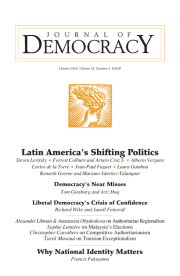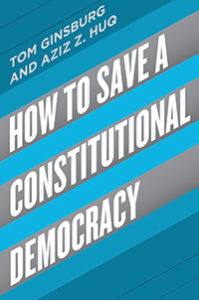Democracies can collapse or erode beyond repair, but they can also suffer substantial yet “non-fatal” deterioration in the quality of democratic institutions, and then experience a rebound, according to Tom Ginsburg and Aziz Huq. Such “near misses” have received little or no attention in the new wave of scholarship on why democracies die (or survive). But case studies of Finland in 1930, Colombia in 2010, and Sri Lanka in 2015 capture the dynamics of democratic near misses, suggesting that non-majoritarian actors, including political-party elites and unelected judges and bureaucrats, have a critical role to play in averting democratic erosion, they write for the National Endowment for Democracy’s Journal of Democracy:
There is no single “magic institution” that can be adopted to prevent democratic backsliding or to arrest it once it has begun. Paradoxically, the experiences of democratic near misses underscore the role of political elites and nonelected institutions—courts, military commanders, and election administrators—in decisively repudiating authoritarian leaders bent on democratic erosion.
A democracy under threat depends critically on support from unelected and nonmajoritarian actors. Such support serves to slow down erosion, giving political parties and public movements time to regroup and reorganize in the face of threats. Of course, no institution is foolproof, and much will depend on contingent choices made by political actors—including mainstream forces that may decide to ally with antisystem actors for tactical reasons.
“Sustained antidemocratic mobilization is hard to defeat, but a well-timed decision by judges, generals, civil servants, or party elites can make all the difference between a near miss and a fatal blow,” they conclude. RTWT
 With global democracy facing serious doubts about its basic health and longevity, comparative studies of safeguards and threats to democracy are multiplying. University of Chicago law professor Tom Ginsburg will join Carnegie’s Thomas Carothers to discuss the constitutional dimensions of democratic decay and survival, the Carnegie Endowment adds.
With global democracy facing serious doubts about its basic health and longevity, comparative studies of safeguards and threats to democracy are multiplying. University of Chicago law professor Tom Ginsburg will join Carnegie’s Thomas Carothers to discuss the constitutional dimensions of democratic decay and survival, the Carnegie Endowment adds.
In a new book, How to Save a Constitutional Democracy, Ginsburg and Aziz Z. Huq analyze lessons from around the world about how constitutions sometimes help and sometimes hurt democracy, including a hard comparative look at the U.S. Constitution and its role in America’s democratic troubles. In this session, Ginsburg will present the main findings of their study, including proposals for legal and constitutional measures that can help reduce the risk of democratic backsliding in both the United States and younger democracies around the world.
9:00 AM — 10:15 AM EST. November 01, 2018. 1779 Massachusetts Avenue NW, Washington, DC 20036-2103 RSVP








